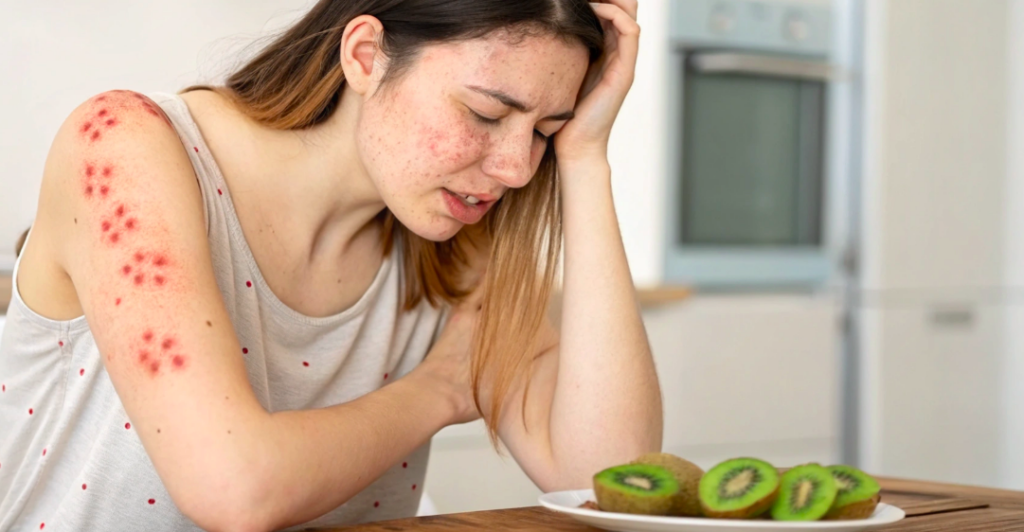Kiwi is a nutritious and delicious fruit enjoyed by many, but for some, it can trigger an allergic reaction. If you’ve experienced an allergic reaction to kiwi, you might wonder, “How long does kiwi allergy last?” The answer can vary depending on the severity of the symptoms and how quickly treatment is initiated. Understanding kiwi allergy symptoms, the underlying causes, and appropriate kiwi allergy treatment is essential for managing this condition effectively. A proper diagnosis and management of allergies are crucial steps to ensure your well-being.
What Causes Kiwi Allergy?
Kiwi allergy occurs when the immune system mistakenly identifies proteins in the fruit as harmful substances. This immune response triggers the release of histamines, leading to allergy symptoms. Kiwi allergy can be classified into two types:
- Primary Food Allergy: This occurs when the immune system reacts directly to proteins in kiwi. It is more common in children and can result in severe symptoms.
- Oral Allergy Syndrome (OAS): This is a cross-reaction between proteins in kiwi and pollen, such as birch or ragweed. OAS typically results in milder symptoms, such as itching or tingling in the mouth.
Kiwi Allergy Symptoms
The symptoms of a kiwi allergy can range from mild to severe and may appear shortly after consuming the fruit. Common kiwi allergy symptoms include:
- Mild Symptoms:
- Itching or tingling in the mouth, lips, or tongue (commonly referred to as “kiwi allergy tongue”).
- Mild swelling of the lips or tongue.
- Skin rashes or hives.
- Moderate Symptoms:
- Abdominal pain, nausea, or vomiting.
- Diarrhea.
- Nasal congestion or sneezing.
- Severe Symptoms:
- Difficulty breathing.
- Swelling of the throat or face.
- Anaphylaxis, a life-threatening reaction that requires immediate medical attention.
How Long Does a Kiwi Allergy Reaction Last?
The duration of a kiwi allergy reaction depends on the severity of the symptoms and how quickly treatment is provided:
- Mild Reactions:
- Symptoms such as itching, tingling, or mild swelling usually subside within a few hours to a day after the allergen is removed or antihistamines are taken.
- Moderate Reactions:
- Digestive symptoms or skin rashes may take 1-2 days to resolve, especially with appropriate medication and care.
- Severe Reactions:
- Severe reactions like anaphylaxis require emergency treatment. While epinephrine can halt the progression of symptoms, recovery may take several days, and medical monitoring is often necessary.
Diagnosis of Kiwi Allergy
If you suspect a kiwi allergy, it’s important to seek a professional diagnosis. Here’s what you can expect during the diagnostic process:
- Medical History: Your doctor will ask about your symptoms, their onset, and any potential triggers.
- Allergy Testing: Skin prick tests or blood tests (such as specific IgE testing) can confirm the allergy.
- Oral Food Challenge: In some cases, under medical supervision, a small amount of kiwi may be consumed to observe for reactions.
Kiwi Allergy Treatment
Managing a kiwi allergy involves avoiding the fruit and treating symptoms promptly if exposure occurs. Here are the key aspects of kiwi allergy treatment:
1. Avoidance
- Eliminate kiwi from your diet and be cautious of products containing kiwi, such as fruit salads, smoothies, or desserts.
- Read food labels carefully to avoid hidden sources of kiwi.
- Inform restaurants and food service providers about your allergy when dining out.
2. Medications
- Antihistamines: Over-the-counter or prescription antihistamines can alleviate mild symptoms like itching, hives, or nasal congestion.
- Epinephrine: For severe reactions, carrying an epinephrine auto-injector (e.g., EpiPen) is essential. Use it immediately if symptoms of anaphylaxis occur.
- Topical Corticosteroids: These can help soothe skin rashes or hives caused by contact with kiwi.
3. Natural Remedies
While medications are the primary treatment, some natural remedies may provide additional relief:
- Rinsing with Water: Gargling or rinsing your mouth with water can help alleviate kiwi allergy tongue symptoms.
- Cool Compresses: Applying a cool compress to itchy or swollen areas can reduce discomfort.
- Probiotics: Some studies suggest that probiotics may support gut health and potentially reduce food allergy symptoms over time.
4. Emergency Response
- In cases of anaphylaxis, use epinephrine immediately and call emergency services. Do not wait to see if symptoms improve.
Preventing Kiwi Allergy Reactions
Prevention is the best approach to managing kiwi allergies. Here’s how you can stay safe:
- Identify Cross-Reactivity: If you have a kiwi allergy, you may also react to other fruits (e.g., bananas, avocados, or melons) or certain types of pollen. Be aware of potential cross-reactive allergens.
- Educate Yourself and Others: Inform family, friends, and coworkers about your allergy so they can help you avoid exposure.
- Carry an Allergy Card: A card listing your allergy and emergency contact information can be helpful when dining out or traveling.
- Wear Medical ID: A bracelet or necklace indicating your allergy can be life-saving in emergencies.
Long-Term Management
While some people outgrow certain food allergies, kiwi allergies are less likely to resolve over time. Regular follow-ups with an allergist can help monitor your condition and explore treatment options, such as immunotherapy, if available.
When to See a Doctor
Seek medical attention if:
- You experience severe symptoms, such as difficulty breathing or swelling of the throat.
- Your symptoms persist or worsen despite treatment.
- You suspect you may have developed an allergy to kiwi or other foods.
Final Thoughts on Kiwi Allergy
Kiwi allergies, though relatively uncommon, can range from mild to life-threatening. Understanding kiwi allergy symptoms, how to treat an allergic reaction to kiwi, and steps to prevent exposure are crucial for managing this condition effectively. If you’re dealing with kiwi allergy tongue or other symptoms, consult a healthcare provider to ensure proper diagnosis and care. With the right precautions and treatment plan, you can lead a safe and healthy life free from the challenges of kiwi allergy.
